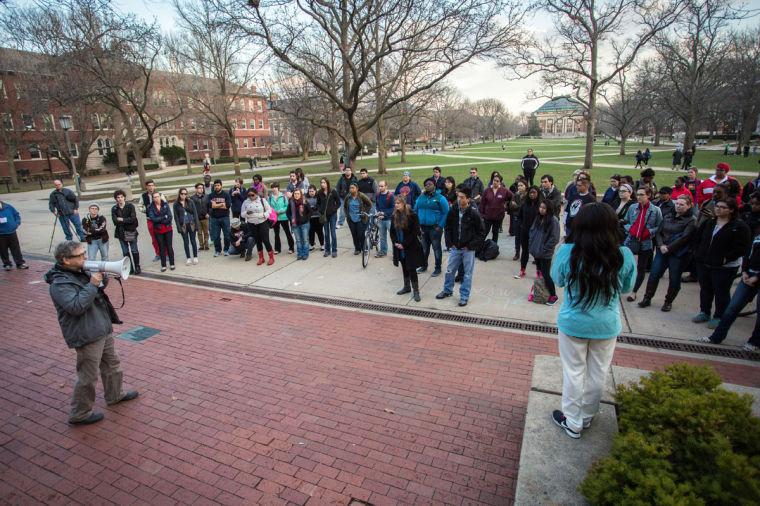Native American student writes letter to UI administration in an effort to ban the Chief
Apr 9, 2014
Last updated on May 11, 2016 at 05:31 a.m.
As depicted in a letter sent to University administration last week, Xochitl Sandoval, a Native American student, struggles everyday with the remnants of the University’s former mascot: Chief Illiniwek.
While administrators stopped supporting the Chief in 2007, students and the local community have continued to keep the mascot alive with apparel, accessories and unofficial appearances of the Chief at sporting events. Additionally, the Chief’s performance music, such as the “Three in One,” still plays at sporting events.
“I don’t go to sports events because I know that that is where pro-Chief people will be congregating at and where they will be playing the music,” Sandoval, a senior in LAS, said. “I see Chief T-shirts and even though the official symbol has been removed, there are still people who are able to get their hands on the official logo, and every year Unofficial always has some kind of spin on the Chief.”
Sandoval struggles with the lingering mascot, specifically in regard to the “disrespect and racism” the mascot represents to her.
Get The Daily Illini in your inbox!
The Native American and Indigenous Student Organization joined forces with Sandoval to host a “Walk with Xochitl” on Tuesday night on the Quad.
“We are walking in support of all people who have to go through any struggle,” said Chris Castle, an officer of the Native American and Indigenous Student Organization. “We are walking in solidarity of Xochitl, and we are walking for each other and the betterment of the University.”
Sandoval’s letter was sent to Chancellor Phyllis Wise, the Board of Trustees, the Office of the Dean of Students, the Office of Diversity, Equity, and Access and other administrators. Sandoval said the University has not yet reached out to her.
“This is a time when we have a strong administration,” Stephanie Skora, junior in LAS, said. “We have a strong chancellor now. We can make the final push to get rid of the Chief once and for all. I’m proud to be a student at the University … and I don’t want this dishonor to be played out any further.”
Sandoval recommended the chancellor prohibit students from wearing apparel or accessories associated with Chief Illiniwek, and went on to say that she will leave disappointed by the University and will not recommend the school to any of her indigenous peers.
Last year, the Board of Trustees made an agreement with Honor the Chief Society, Inc., an organization that wanted to register the Chief Illiniwek trademark to use for dance and educational services.
As a result, the Honor the Chief Society abandoned its application and agreed to not file any other trademark applications; however, the University cannot object to the organization’s events that honor the Chief or its desire to reinstate the Chief.
The society’s website lists that the University does not support its efforts, and they can no longer refer to “Chief Illiniwek.”
Holley Nast, a Native American sophomore from Parkland College who planned to attend the University, said she is transferring to Oklahoma State University in the fall.
“While I was touring, I felt more of a connection there than I have in the few years I’ve lived in Champaign,” Nast said. “I think that really says something … I feel that a lot of alumni have been hurt because of the Chief … we’re talking about lives here and the University administration should act.”
In the letter, Sandoval expressed her experience at the University, beginning with an anecdote of how a student was wearing a sweatshirt with the Chief on it and it made her feel uncomfortable.
“What pushed me to write the letter was that I was at my wit’s end,” Sandoval said. “I honestly didn’t think this letter was going to spread as quickly and as far as it did, but I wanted to have my lived experience here documented and be my final statement to the University.”
After meeting with an attorney in March, she received information that she could confront the student or the class. However, she believed this to be a “band-aid solution to this problem that has caused such an immense psychological damage to not only myself, but countless others.”
She wrote, “on March 11, I had the thought that I should commit suicide.” At the event, Sandoval told attendees that she is still upset, but is now OK.
Last year, Sandoval helped create a student group, Campus Spirit Revival, to brainstorm ideas for a new mascot. However, another group formed in protest, Stop Campus Spirit Revival, diminishing the progress.
Steve Kaufman, professor emeritus in the College of LAS, said that while there has been progress with the mascot, there is much more that needs to be done.
“They are not going to come to you, you have to take this to them,” Kaufman said. “They cannot justify how playing the Chief’s music does anything to promote the values of the University; it does just the opposite.”
He went on to say that Chancellor Wise promotes diversity; however, she did not attend the event and will not talk about the issue when people approach her on it.
“They’ve adopted a policy of doing nothing,” Kaufman said. “Stop blaming the NCAA … Gather all the minority groups together … The only ones they can blatantly disregard is the Native American students because of the low numbers (of students).”
Megan can be reached at [email protected].






